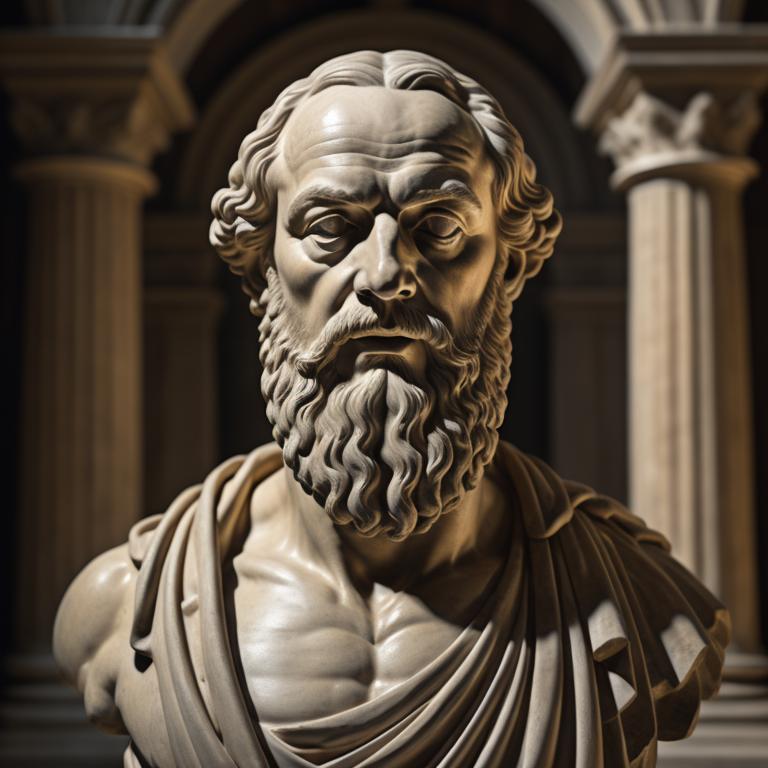
Socrates
Socrates: Exploring His Philosophy
Socrates
His philosophy in one sentence:
Socrates believed that true knowledge comes from questioning and exploring our own ideas and beliefs.
His philosophy:
Socrates was a Greek philosopher considered the father of Western philosophy. His focus was on self-discovery and critical thinking. He believed that through dialogue and self-inquiry, one could arrive at genuine knowledge. Socrates left nothing in writing, but his legacy lives on through the works of his disciples, especially Plato.
Explanation to a child:
Imagine that you are like a little detective inside your mind. You have many questions about the world and how it works. Instead of believing everything you’re told, Socrates would encourage you to ask questions, even if others don’t. By doing so, you discover new things and learn how things work. So keep asking and exploring, because that will make you smarter and wiser!
Explanation to an adult:
Socrates’ philosophy places great emphasis on the importance of self-reflection and critical questioning. He believed that to achieve truth and genuine knowledge, one must be aware of one’s own beliefs and opinions, question them, and examine them thoroughly. Through open and honest dialogue, we can unravel the contradictions and limitations of our thoughts and ultimately come to a deeper, wiser understanding of ourselves and the world around us.
Negative aspects of this philosophy:
Although Socratic philosophy encourages the search for truth and self-knowledge, it may also have some limitations. Some people may feel uncomfortable or unsafe questioning their own deeply held beliefs, which can lead to resistance and rejection of this practice. In addition, constant questioning can generate some anxiety or confusion, since there are not always clear or definitive answers to all the questions posed.
A real problem suitable for applying this philosophy:
A real problem that would be appropriate for applying Socrates’ philosophy would be making important decisions, such as choosing a career path. By questioning our abilities, passions, and motivations, we can come to a more informed and meaningful choice.
To solve this problem, a process of self-inquiry is recommended. Asking questions like “What am I passionate about?” or “What am I really good at?” we will be able to explore our own motivations and underlying values. In addition, talking to people close to us and listening to different perspectives can also enrich our understanding of ourselves and our options.
A paradox using this philosophy:
A paradox that arises from this philosophy is that while questioning and self-reflection are fundamental to knowledge, we must also recognize that there are limitations to what we know and what we can discover. That is, by knowing more, we are also more aware of how much we do not know.
An opposite philosophy:
Moral relativism maintains that there are no absolute or universal truths, and that each individual has his or her own truth based on his or her personal perspective and experience.
Explanation of this opposing philosophy:
Moral relativism argues that what is right or wrong can vary by culture, time, and circumstances. Instead of seeking objective truth, it focuses on respecting and accepting each person’s different perspectives and values, avoiding absolute judgments about what is morally right or wrong. However, some critics argue that this approach can lead to extreme relativism and a lack of sound ethical principles to guide human conduct.

Another philosophy opposite to that of Socrates.
The philosophy of nihilism
Nihilism is a philosophy that holds that life is meaningless and that there is no such thing as truth or morality. This is in direct contrast to Socrates’ belief that the pursuit of knowledge is the highest good and that virtue is knowledge.
Positive aspects of nihilism
Nihilism can have some positive aspects. For example, it can free people from the burden of expectations and obligations. It can also lead to a more tolerant and understanding attitude towards others, as people realize that there is no right way to live.
Negative aspects of nihilism
However, nihilism can also have some negative aspects. For example, it can lead to despair and lack of hope as people see no point in living. It can also lead to a lack of motivation and creativity, as people don’t see the point in trying to achieve anything.
Why is it the opposite of Socrates’ philosophy?
Socrates believed that the pursuit of knowledge was the highest good. He believed that by knowing the truth, we could live a better life. Nihilism, on the other hand, denies the existence of truth. It also denies the existence of morality. That is why nihilism is considered the opposite of the philosophy of Socrates.

Sources
Books:
- Platón, La Apología de Sócrates. Traducido por Benjamin Jowett. Oxford University Press, 2007.
- Jenofonte, Memorabilia. Traducido por Amy L. Bonnette. Cornell University Press, 2002.
- Aristóteles, Ética Nicomáquea. Traducido por Terence Irwin. Hackett Publishing, 2014.
Websites:
- Sócrates: https://plato.stanford.edu/entries/socrates/ por Mark L. McPherran, Stanford Encyclopedia of Philosophy.
- Escepticismo: https://www.britannica.com/topic/skepticism por Edward Craig, Encyclopædia Britannica.
- La Filosofía de Sócrates: https://www.iep.utm.edu/socrates/ por Gregory Vlastos, Internet Encyclopedia of Philosophy.





0 comments